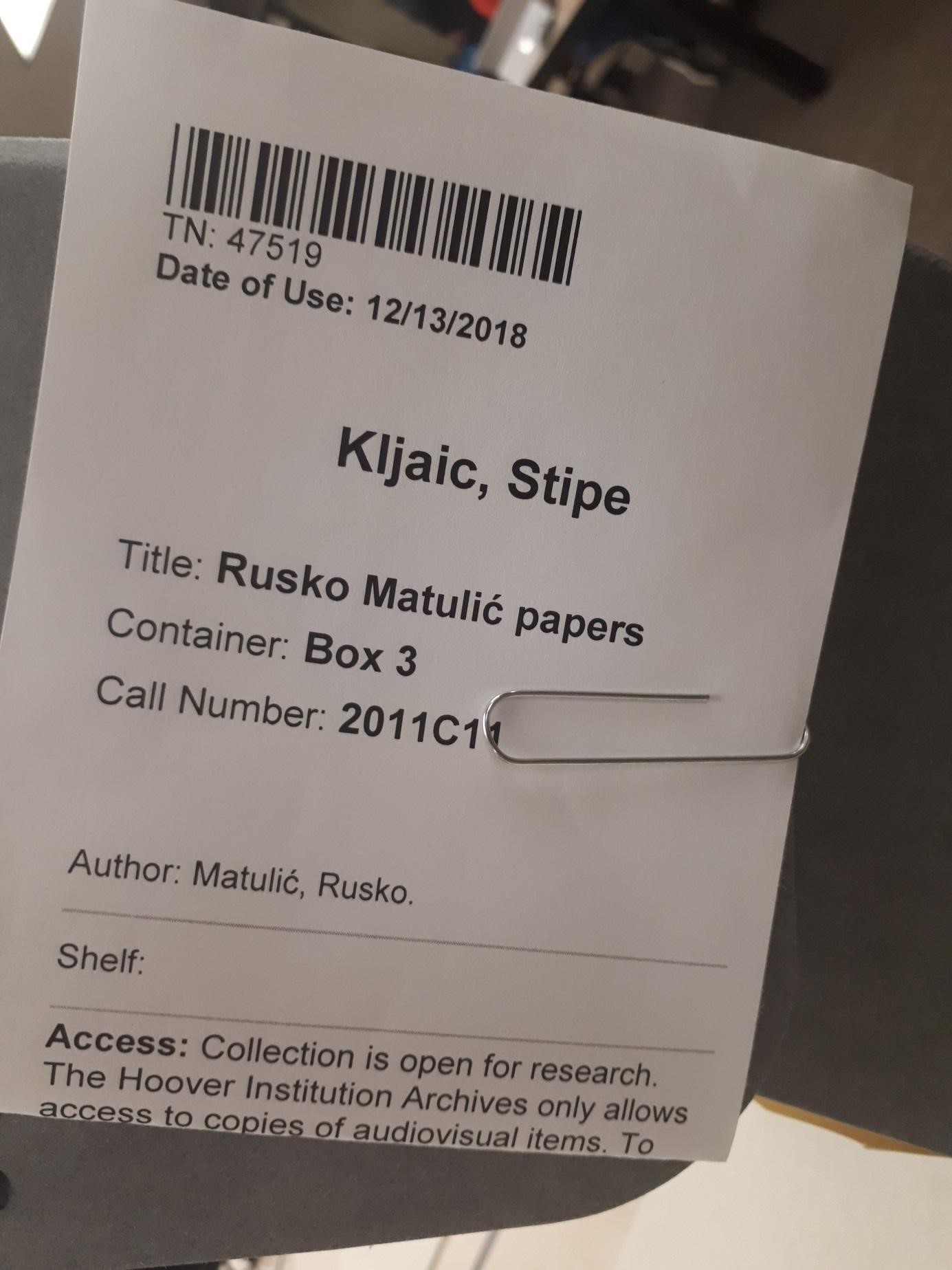The Rusko Matulić Collection contains 24 boxes of archival materials and is filed under internal number 2011C11 at the Hoover Institution Archives. Its contents mostly cover Matulić's volunteer work for CADDY.
The collection contains numerous letters and other correspondence, memorandums, addresses, lectures and speeches by various actors on the immigrant and dissident scene, as well as numerous individuals and other US institutions interested in the status of human and political freedom in Yugoslavia after Tito's death. Matulić's collection contains various materials and information about circumstances in Yugoslavia in the 1980s, as well as cases of the regime’s political persecution of dissidents. The collection includes material on the most famous political trials against Franjo Tuđman, Marko Veselica, Vlado Gotovac, Dobroslav Paraga, Vladimir Šeks, Gojko Đogo, Vojislav Šešelj, Ernst Brajder, Dragoljub Mićunović, Janez Janša and his group (Ivan Borštner, David Tasić and Franc Zavrl) known under the abbreviation JBTZ, the “Belgrade Six," etc.
Besides court trials, the collection also contains testimony on the activities of these dissidents, and their articles, letters and appeals to the international public and US institutions. Thus, Vladimir Šeks, as president of the Croatian Human Rights Federation in the SFRY, addressed an appeal to the American Bar Association (ABA) through Matulic and CADDY, requesting that it put pressure on the Yugoslav authorities to allow his attorney to effectively defend dissidents in political trials. In the Franjo Tuđman case, CADDY tried to influence the American Historical Association (AHA) to advocate for Tuđman's defence in court proceedings. Based on the collection, it is apparent that CADDY provided significant support to the dissident circle in Belgrade gathered around Serbian writer and dissident Dobrica Ćosić known as the Committee for the Defence of Freedom of Thought and Expression. The collection contains numerous materials that the CADDY collected about dissident activities in Yugoslavia and presented to the American political and intellectual public, writing letters and appeals to various scholarly and university organizations, Congress, the Senate and individuals members thereof, as well as President Reagan, to inform them of the restricted political liberty and human rights violations in Yugoslavia.
Besides Mihajlov, Matulic also worked closely with Vane Ivanovic and Desimir Tošić in his work at CADDY. This was actually a group of émigrés from Yugoslavia gathered around the émigré review called Naša reč (Our Word) and the Democratic Alternative organization founded in London in 1956. Democratic Alternative gathered Matulić's supporters of pro-Yugoslavian orientation who advocated for the survival of the Yugoslav state, but at the same time they demanded its internal democratization. Most of them were Serbian political émigrés, but some were also Slovenian, Croatian and Bosnian Muslim. Apart from the already mentioned Tošić and Ivanović, there were other personalities, such as Adil Zulfikarpašić, Branko Pešelj, Ivan Jukić, Vladimir Predavac, Bogoljub Kočović, Ljubo Sirc, Nenad Grisogono, etc.. Among Croatian émigré circles, Matulić maintained the closest relationships with Jakša Kušan and his magazine Nova Hrvatska (New Croatia) in London, and Jure Prpić, who was a historian from John Carroll University in Cleveland. An important collaborator of Matulic and the CADDY was Oskar Gruenwald, originally from Vojvodina, who worked at an American research institute in Santa Monica, California. He also was involved in editing and writing for the anthology Human Rights in Yugoslavia in 1986. (Rusko Matulic Papers, box 2).
The Rusko Matulić Collection testifies to the strong influence that CADDY had during the 1980s, so that its activities were noted in various newspapers and the international, émigré and Yugoslav press. In addition to the Russian émigré scene, which was interested in Yugoslavia because of Mihajlov, the following newspapers and magazines wrote about the work and mission of CADDY: The New York Times, The New Leader, Vjesnik, Nova Hrvatska, Croatia State, Russkaya mysl’, South Slav Journal, American Srbobran, Naša Reč, Danica, Slavic Review, and The New Republic.

